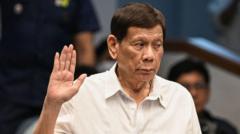In a controversial testimony, former Philippine president Rodrigo Duterte admitted to maintaining a "death squad" during his tenure as mayor to combat crime, igniting further debate on the legacy of his infamous war on drugs.
Duterte Confirms Existence of 'Death Squad' During Drug War Inquisition

Duterte Confirms Existence of 'Death Squad' During Drug War Inquisition
Former Philippine President reveals shocking details about his anti-drug policies in a Senate hearing.
In a historic Senate hearing, 79-year-old Rodrigo Duterte candidly confessed to overseeing a "death squad" composed of gangsters, emphasizing his intense disdain for illegal drugs. During this session—the first since his presidency ended in 2022—Duterte claimed, “I hate drugs, make no mistake about it,” while remaining unapologetic about his actions.
Duterte is currently under investigation by the International Criminal Court concerning the thousands of fatalities linked to his anti-drug operations, which have been marked by controversy and allegations of extrajudicial killings. He recounted that he would instruct members of the squad to carry out executions of targeted individuals, adding a chilling directive: “kill this person, because if you do not, I will kill you now.”
Despite the mounting evidence of violence, Duterte maintained that he didn’t sanction police chiefs to kill on his behalf. He delineated the "death squad" as comprised of gangsters rather than law enforcement, stating, “I can make the confession now… but they were not police.”
His testimony was met with responses from the families of victims who suffered in the drug war, as well as from critics like former senator Leila de Lima, who has been vocal against his policies and served years in prison for what many deemed a politically motivated drug charge.
The drug war has been a devastating chapter in Philippine history, with the government estimating over 6,252 deaths linked to police and vigilante actions. Human rights organizations suggest that the actual toll may be significantly higher. A UN report previously suggested that Duterte’s rhetoric may have emboldened police actions that led to numerous fatalities under the guise of self-defense during drug raids.
Despite harsh criticism, Duterte remains a polarizing figure, with a significant base of support from citizens grappling with rampant drug use. His candid admission continues to open wounds regarding the ramifications of his policies on Philippine society.
Duterte is currently under investigation by the International Criminal Court concerning the thousands of fatalities linked to his anti-drug operations, which have been marked by controversy and allegations of extrajudicial killings. He recounted that he would instruct members of the squad to carry out executions of targeted individuals, adding a chilling directive: “kill this person, because if you do not, I will kill you now.”
Despite the mounting evidence of violence, Duterte maintained that he didn’t sanction police chiefs to kill on his behalf. He delineated the "death squad" as comprised of gangsters rather than law enforcement, stating, “I can make the confession now… but they were not police.”
His testimony was met with responses from the families of victims who suffered in the drug war, as well as from critics like former senator Leila de Lima, who has been vocal against his policies and served years in prison for what many deemed a politically motivated drug charge.
The drug war has been a devastating chapter in Philippine history, with the government estimating over 6,252 deaths linked to police and vigilante actions. Human rights organizations suggest that the actual toll may be significantly higher. A UN report previously suggested that Duterte’s rhetoric may have emboldened police actions that led to numerous fatalities under the guise of self-defense during drug raids.
Despite harsh criticism, Duterte remains a polarizing figure, with a significant base of support from citizens grappling with rampant drug use. His candid admission continues to open wounds regarding the ramifications of his policies on Philippine society.





















